[ad_1]
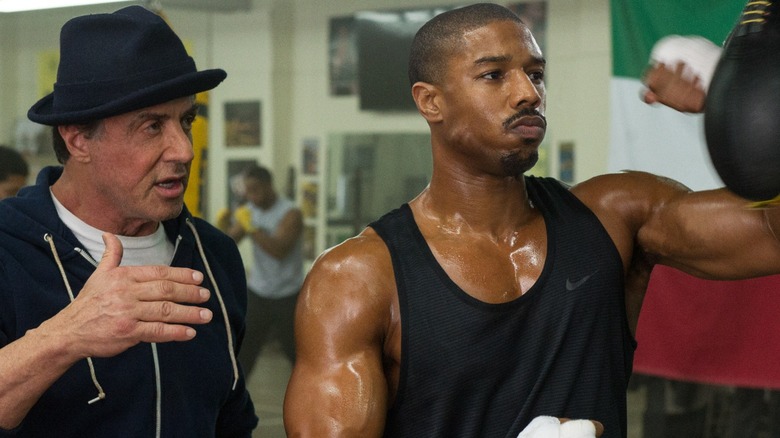
Film franchises get revisited all the time. Whether it’s reboots, remakes, prequels, or legacy sequels, no classic movie is safe from resurrection. More often than not, you get the cynical brand extension of the “Jurassic World” series, which largely produced movies that feel like endless box-checking. However, there are times when a filmmaker takes the reins on a beloved series, less interested in revisiting it for simple nostalgia than examining and recontextualizing it, producing a new classic in the process. There’s no better example than the 2015 film “Creed,” a legacy sequel to the “Rocky” series.
“Creed” is a movie dealing intimately with themes of grief, legacy, perseverance, and identity. Director Ryan Coogler brought the visceral immediacy and naturalism (and star) of his low-budget 2013 debut “Fruitvale Station” to a beloved Hollywood series that was largely finished. 2006’s “Rocky Balboa” was a belated conclusion to the story of its title character, largely made because writer-director-star Sylvester Stallone hadn’t liked 1990’s “Rocky V,” which originally had a more tragic ending. There was little story left for the character, particularly as envisioned by Stallone.
An outsider’s view like Coogler’s was necessary and revelatory. Rather than continue to repeat the familiar narrative beats of the series, he found new routes into its conventions. The movie’s biggest departure was sidelining Rocky (Stallone) in favor of Adonis Johnson (Michael B. Jordan), the illegitimate son of Rocky’s late friend Apollo Creed (Carl Weathers). Its second biggest departure was bringing the series back to its roots.
Origins
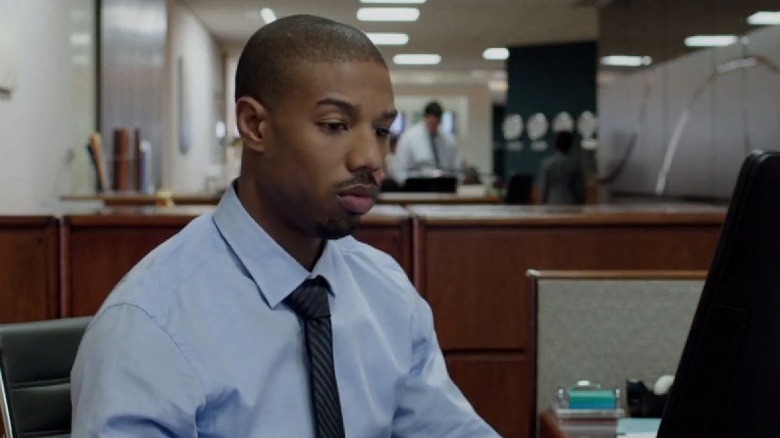
It’s hard to imagine any “Rocky” movie past the original opening with the tone of “Creed.” A youth detention center in ’90s Los Angeles, filled with kids who’ve ended up on the wrong side of the law. Those opening shots tell a story of their own. When one of the kids turns out to be Adonis “Donnie” Johnson, son of Apollo Creed, it’s hard not to think about how easily he could have fallen through the cracks. If he weren’t the son of an extremely wealthy and famous boxer, he likely would have.
Instead, he’s taken in by Apollo’s wife Mary Anne (Phylicia Rashad), who raises him in the lap of luxury. 17 years pass, leaving their relationship largely unexplored, but we see enough to know the depth of their affection for one another. We also see she hates boxing, a hobby that grown-up Donnie embraces with gusto, flying out to Tijuana on the weekends and working an office job during the week. His passion is overpowering – we see him shadowbox clips of his old man, and we see him leave his job behind so he can pursue what he really wants: to fight.
The movie’s lowkey naturalism is a far cry from the bombast that overtook the “Rocky” series. In “Rocky IV,” Apollo Creed died while facing off against a seemingly superhuman Russian boxer named Ivan Drago (Dolph Lundgren), in one of the series’ silliest entries, even if Stallone tried to make it feel authentic. “Creed” is less about international relations at the height of the Cold War and more about the man at its center, the father he never knew, and the father figure he will find.
Philadelphia
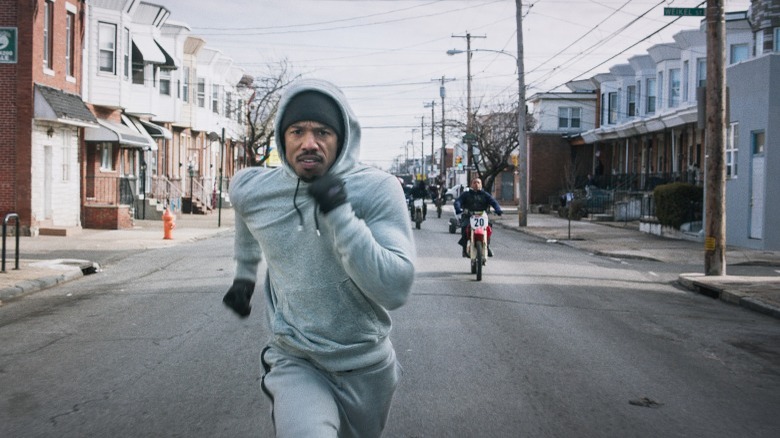
When his local gym rejects him, Donnie leaves Los Angeles for the streets of Philadelphia, hoping to reconnect with his late father’s rival and friend, Rocky. The man has retired following the events of 2006’s “Rocky Balboa,” one of the best films of the series and a solid finale for a beloved character. Like the gym Donnie sought out earlier, Rocky declines the invitation to train Donnie. It’s only when Donnie asks about an off-the-record fight between Apollo and Rocky, one that took place at the freeze-frame end of “Rocky III,” that the old man takes an interest.
So Donnie trains, calling Rocky “Unc” all the while, and the movie settles into a relaxing groove familiar to “Rocky” fans. Rather than finding traditional ways to train, Donnie catches chickens, and helps stock up Rocky’s restaurant. He’s getting better at fighting too. Removed from the tragic circumstances of his childhood and his more sheltered upper-class adolescence, he gets the chance to find himself, embracing the rigors of training and the joys of following in his father’s footsteps for the first time.
Donnie also gets the chance to fall in love with a local musician named Bianca (Tessa Thompson), who, like Adrian (Talia Shire) in the first couple “Rocky” movies, is a fully developed character, more than a love interest who has a complicated relationship with boxing. Her own passion for music and her rapid hearing loss reflects on Rocky and Donnie in unique ways as well.
Building A Legacy
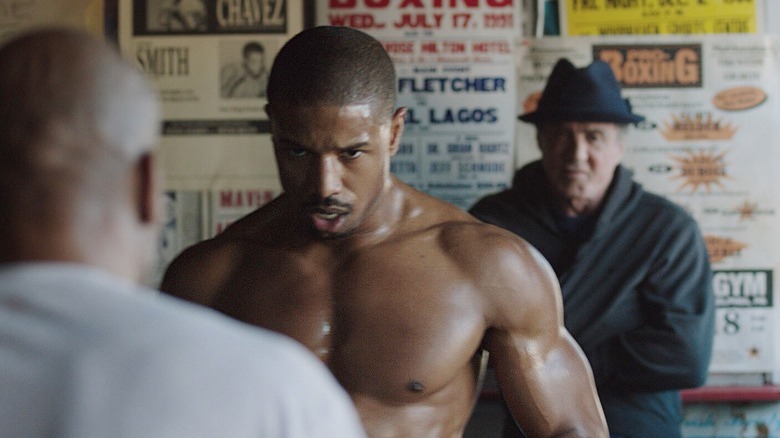
Donnie doesn’t go by Adonis Creed. He goes by Adonis Johnson, hoping to forge his own identity outside of what his world-famous father accomplished. But as his stature grows in the boxing community, it becomes harder. His winning bout against Leo “The Lion” Sporino (Gabriel Rosado), told in a gripping, breathtaking single shot, has put the spotlight on him. When his name is leaked to the press, his sense of self-actualization is stunted, as he is considered simply his father’s illegitimate son.
That’s why he becomes a prime target for the designs of jail bound Liverpool boxer “Pretty” Ricky Conlan (Tony Bellew), the world light heavyweight champion, hoping to score an easy victory against a name boxer before he goes to prison. His only condition is that Donnie changes his surname to Creed.
Because the movie goes to such great lengths to simply show its characters simply living, these moments sting even more. Faced with the challenge of a world champion, Donnie is about to lose his trainer as well: Rocky’s non-Hodgkin’s lymphoma diagnosis has pushed him to the brink of despair. Director Ryan Coogler has often cited his father’s cancer diagnosis as an influence on “Creed,” just one element of how personal the movie was for him. “That’s the story I wanted to tell,” he said to the Philadelphia Inquirer, a story of how grief and fear can become a powerful fuel, how worry over the future doesn’t have to stop you from fighting.
Going The Distance
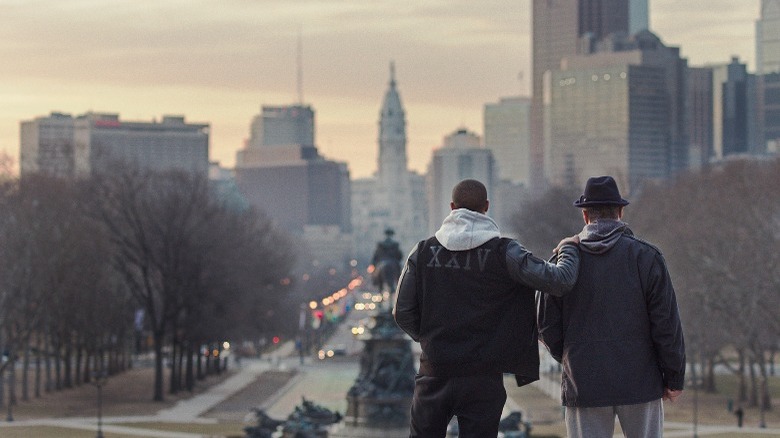
The movie flies towards its climactic match as Rocky deals with the pain of chemotherapy and Donnie the anxiety of proving his name. Both Mary Anne and Bianca have trepidation as well, scared for what awaits Donnie as they should be.
The final match ties the stories of Rocky and Donnie together, with the old man expressing gratitude for his trainee’s ambition and drive, how it rubbed off on him in return. As the fight turns in Conlan’s favor, Donnie collapses to the ground, only waking up at the mental image of his father at the height of his powers. Rocky feels worse for helping Donnie participate in it, increasingly worried for his safety. But Donnie keeps going, needing to prove, ultimately, that he’s “not a mistake.”
It’s a stirring scene. If not as spectacular as the single-shot sequence earlier in the movie, it’s much more dramatically involving, alternating between clips of an HBO broadcast of the fight and the actual fight, where every blow becomes a bigger threat.
Donnie goes the distance, finally accepting the name Creed. He loses the fight, but succeeds in proving himself as an accomplished boxer all his own. Not just a name, and not just an echo of his father’s legend. The movie’s epilogue is as gentle as the rest of it, with Donnie and a down-but-not-out Rocky climbing the familiar stone steps of the Philadelphia Museum of Art. In the first movie, that visual signified the title character’s drive and willingness to climb. Here, it becomes a reflection of the movie’s take on legacy, a metanarrative on what revisiting an old franchise means, and tribute to the beloved Rocky.
Read this next: 14 Remakes That Are Better Than The Original
The post Creed Ending Explained: One Step At A Time, One Punch At A Time, One Round At A Time appeared first on /Film.
[ad_2]
Source link

